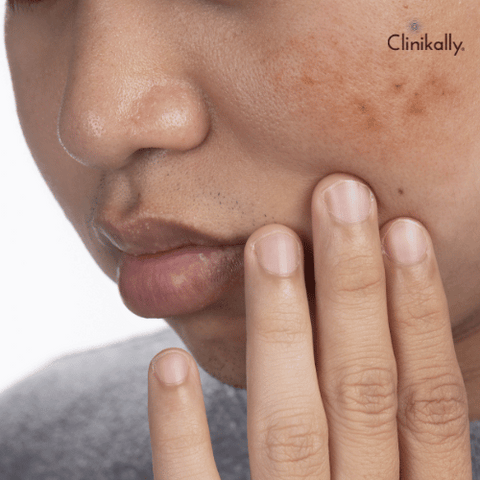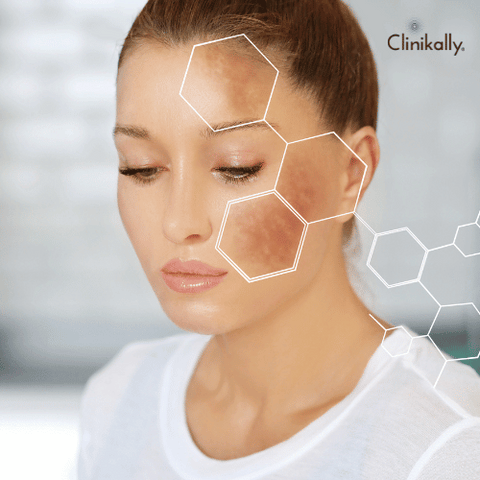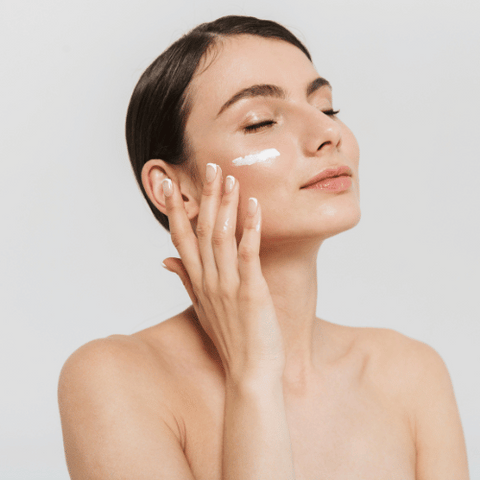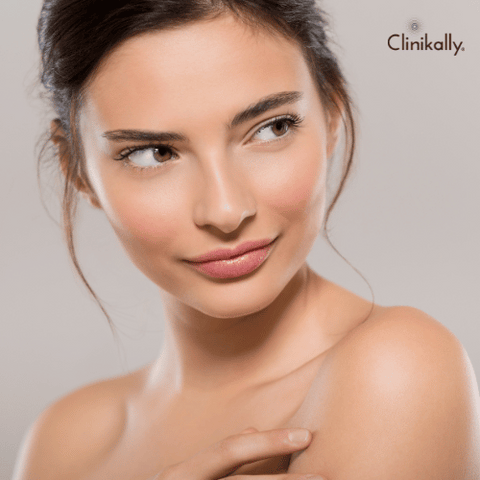Brown spots, also known as age spots or sun spots, are common skin problems caused by a number of factors, including UV exposure, aging, and genetics. While they are not harmful, they can make some people feel self-conscious. In this blog, we will look more closely at how to get rid of brown spots including treatment and home remedies.
What are Brown Spots?

Brown spots, also called age spots or sun spots, are flat, brown or black patches of skin that commonly develop on parts of the body that are exposed to the sun, like the face, hands, arms, and shoulders. They are more prevalent in people over 50 and are brought on by an excess of melanin, the pigment that gives skin its color. Brown spots are usually not harmful, but they can make some people feel self-conscious and could be an indication of sun damage or other skin issues.
Types of Hyperpigmentation: Sun Damage, Age Spots, and Melasma
Any condition that causes patches or spots of darker skin is referred to as hyperpigmentation. There are several different kinds of hyperpigmentation that can happen, although brown spots are one of the most common. The following are the top three forms of hyperpigmentation:
-
Sun damage: Sun damage happens when the skin is exposed to the sun's ultraviolet (UV) radiation, which increases the production of melanin. Brown spots, uneven skin tone, and freckles may appear as a result of tanning.
-
Age spots: Age spots, also known as liver spots, are brown spots that typically appear on areas of the skin that have been exposed to the sun over time, such as the face, hands, and arms. They are most prevalent in people over 50 and are brought on by an excess melanin production.
-
Melasma: Melasma is a type of hyperpigmentation that is caused by hormonal changes in the body, such as pregnancy, menopause, or the use of birth control pills. It frequently affects women more than men and manifests as brown or grey-brown patches on the face. Melasma is frequently referred to as "the mask of pregnancy" due to the fact that it frequently affects pregnant women and can also be brought on by sun exposure.
Causes of Brown Spots: Sun Exposure, Aging, Hormones, and Genetics
The reasons for brown spots can vary, but the following are the most typical ones:
-
Sun exposure: Being exposed to the sun's UV radiation is the most frequent cause of brown spots. Brown spots may appear as a result of increased melanin production brought on by this exposure over time.
-
Aging: Our skin loses its capacity to repair itself and produce new skin cells as we get older. Brown spots may develop as a result of an accumulation of sun damage in this way.
-
Hormones: Brown spots can form as a result of hormonal changes, such as those that take place during menopause or pregnancy, which cause the skin to produce too much melanin.
-
Genetics: Some individuals may be genetically predisposed to brown spots. Brown spots, for instance, may appear more frequently in older people with fair skin.
Inflammation or injury to the skin, as well as some medications, such as those used to treat acne, can also cause brown spots to appear.
How to Treat Brown Spots

Brown spots can be treated in a number of ways, but the effectiveness of each depends on the origin and severity of the spots. Here are a few typical remedies:
-
Topical treatments: Hydroquinone, kojic acid, vitamin C, and retinoids are among the over-the-counter anti-pigmentation creams and serums that can help fade brown spots. A dermatologist may also recommend prescription-only creams.
-
Chemical peels: A chemical solution is applied to the skin during a chemical peel to remove the top layer of skin cells and reveal new, fresh skin underneath. This can help fade brown spots over time.
-
Microdermabrasion: Using a specialized tool, the top layer of skin cells are gently exfoliated during microdermabrasion. Brown spots may gradually look better as a result of this.
-
Laser therapy: Laser therapy breaks up the pigment in brown spots with focused light beams, allowing the body to absorb and remove the pigment over time.
-
Cryotherapy: Cryotherapy involves using liquid nitrogen to freeze the brown spots, which eventually causes them to peel off.
To avoid brown spots, it's important to remember that prevention is the key. New brown spots can be avoided by using sunscreen with at least SPF 30 and limiting your exposure to the sun.
Topical Treatments for Brown Spots: Vitamin C, Retinoids, and Chemical Peels
Brown spots can sometimes be removed with topical treatments. Here are some common topical treatments:
-
Vitamin C: A potent antioxidant, vitamin C can lighten brown spots and smooth skin. It functions by preventing the synthesis of melanin, which gives skin its color. The most potent form of vitamin C is L-ascorbic acid, so look for products that contain it.
-
Retinoids: Vitamin A-derived retinoids are renowned for their ability to rejuvenate the skin and fight aging. They function by accelerating cell turnover and encouraging the development of fresh skin cells, which can aid in the fading of brown spots. Look for products with retinol or tretinoin with a prescription.
-
Chemical peels: A chemical solution is applied to the skin during a chemical peel to remove the top layer of skin cells and reveal new, fresh skin underneath. This can help fade brown spots over time. Look for peels that contain alpha hydroxy acids (AHAs) or beta hydroxy acids (BHAs).
Professional Treatments for Brown Spots: Laser Therapy and Microdermabrasion
Professional treatments are another option for treating brown spots in addition to topical ones. The following are two typical professional therapies:
-
Laser treatment: Laser treatment targets and destroys the pigmented cells that result in brown spots. The body then absorbs the degraded pigment, giving the skin a more even tone. Laser therapy can be extremely effective, but it may take several sessions to see the desired effects. After treatment, it's crucial to shield the skin from additional sun exposure.
-
Microdermabrasion: In microdermabrasion, tiny crystals are sprayed onto the skin, and the top layer of dead skin cells is then vacuumed up with them. Brown spots may gradually appear less frequently as a result of this. In comparison to laser therapy, microdermabrasion is a more gentle option, but it may take several sessions to see the desired results.
It's significant to note that both of these professional treatments have a potential cost and might not be covered by insurance. Before beginning treatment, it's crucial to go over any potential risks or side effects with a trained professional.
Combining Treatments for Best Results
The best outcomes for brown spots are frequently achieved by combining various treatments. For instance, combining a topical treatment with a medical procedure, such as laser therapy, can result in more potent and long-lasting effects than either treatment by itself. It's important to go over any risks or side effects with a licensed medical professional before beginning combination therapy. Furthermore, it's important to remember that brown spots can come back over time, especially if you continue to expose yourself to the sun. As a result, it's critical to take precautions to stop the development of new brown spots, such as wearing sunscreen every day, limiting your exposure to the sun, and donning sun-protective gear like hats and sunglasses. Maintaining results and avoiding the appearance of new brown spots can be facilitated by maintaining consistency in a skincare routine that includes hyperpigmentation-specific treatments.
Skincare Tips to Prevent Brown Spots

It takes a combination of good skin care practices and healthy lifestyle choices to prevent brown spots. Here are some recommendations for avoiding brown spots:
-
Wear sunscreen: Sun exposure is a major contributor to brown spots, so shielding your skin from UV rays by wearing sunscreen with an SPF of at least 30 can help.
-
Avoid tanning beds: They can increase your risk of developing brown spots and other forms of hyperpigmentation, as well as sun damage.
-
Wear protective clothing: You can help protect your skin from the sun's harmful rays by donning protective clothing such as hats, long sleeves, and sunglasses.
-
Use specific skincare products: Vitamin C, niacinamide, and kojic acid are some examples of ingredients in skincare products that can help prevent and lessen the appearance of brown spots.
-
Do not pick at your skin: Picking at your skin can irritate and inflame it, which can result in scarring and hyperpigmentation.
-
Control your stress: Since stress can cause hormonal changes that can result in hyperpigmentation, controlling your stress with methods like meditation, yoga, or exercise can help you avoid brown spots.
-
Eat a healthy, balanced diet: A diet rich in fruits, vegetables, and whole grains can help give your skin the nutrients it needs to stay healthy and ward off brown spots.
Applying these suggestions to your daily routine will help you avoid brown spots and keep your skin looking healthy and young.
Wearing Sunscreen and Protecting Skin from UV Damage
One of the most crucial steps you can take to maintain healthy, youthful-looking skin and prevent brown spots, skin cancer, and other types of skin damage is to wear sunscreen and protect your skin from UV rays. Here are some tips for protecting your skin from UV damage:
-
Apply a broad-spectrum sunscreen to all exposed skin for at least 15 minutes before venturing outside. The SPF should be at least 30. Reapply at least every two hours, and more often if you're swimming or perspiring.
-
When the sun is at its strongest, from 10 a.m. to 4 p.m., seek shade whenever you can.
-
To shield your skin from the sun's harmful rays, put on breathable, long-sleeved clothing, pants, and a wide-brimmed hat.
-
Wear sunglasses that completely block UV rays to safeguard your eyes and the sensitive skin around them.
-
Tanning beds emit dangerous UV radiation that can harm your skin and raise your risk of developing skin cancer.
-
Your risk of developing sunburn and skin damage is increased by the reflection of UV radiation by water, snow, sand, and concrete.
Using Antioxidants, Exfoliants, and Moisturizers for Healthy Skin
In addition to sunscreen and UV protection, including antioxidants, exfoliants, and moisturizers in your skincare routine can help you maintain healthy skin and avoid brown spots. Antioxidants like vitamin C and others can aid in shielding the skin from oxidative harm brought on by free radicals and UV radiation. Regular application of a vitamin C serum or cream can help brighten the skin and lessen the visibility of brown spots.
Exfoliating the skin can help to remove dead skin cells and speed up cell renewal, both of which can lessen the appearance of brown spots. Alpha-hydroxy acids (AHAs) and beta-hydroxy acids (BHAs), two types of chemical exfoliants, can help promote cell turnover and lessen the appearance of hyperpigmentation.
By keeping the skin hydrated and supple, using a moisturizer can also lessen the visibility of fine lines and wrinkles. Well-hydrated skin is less vulnerable to injury, which can aid in preventing the development of brown spots. Hyaluronic acid, glycerin, and ceramides are effective at retaining moisture and enhancing skin health, so look for products that contain these ingredients. Maintaining a healthy diet and way of life is also crucial because things like stress and inadequate nutrition can wreak havoc on the skin and cause brown spots. Brown spots can be avoided by drinking plenty of water and eating a diet rich in omega-3 fatty acids and antioxidants, which can help to maintain healthy skin.
Maintaining a Healthy Diet, Water Intake, Sleep Schedule, and Stress Management
The promotion of general health, which can also have a favorable effect on skin health and the avoidance of brown spots, includes maintaining a healthy diet, drinking enough water, getting enough sleep, and managing stress. The following advice:
-
Eat a nutritious, well-balanced diet: A diet rich in a variety of fruits, vegetables, lean proteins, and whole grains can give your body the vitamins, minerals, and antioxidants it needs to support the health of your skin. Foods high in vitamin C, vitamin E, and beta-carotene are especially good for the health of your skin.
-
Keep hydrated: Drinking enough water keeps skin hydrated, giving it a plump, healthy appearance. Aim for 8 cups or more of water each day.
-
Get enough sleep: Lack of sleep can cause stress and inflammation, which can make skin problems worse. To promote general health and skin health, aim for 7-9 hours of sleep each night.
-
Control your stress: Stress can cause hormonal changes and inflammation that can result in skin issues. Engage in stress-reduction exercises, such as yoga, meditation, or deep breathing.
Following these recommendations will help you maintain good skin and overall health, which can help stop brown spots from developing.
Get Healthy, Spot-free Skin!

To sum up, brown spots are a common and annoying skin concern for many people, but there are effective treatments and prevention strategies available. It's critical to understand the various types of hyperpigmentation and the factors that can contribute to their development, such as sun exposure, aging, hormones, and genetics. Brown spots can be reduced with topical treatments such as vitamin C, retinoids, and chemical peels, as well as professional treatments such as laser therapy and microdermabrasion. Sun protection, antioxidants, exfoliants, moisturizers, and a healthy lifestyle, on the other hand, can all help to prevent the development of brown spots and maintain healthy, radiant skin.









































